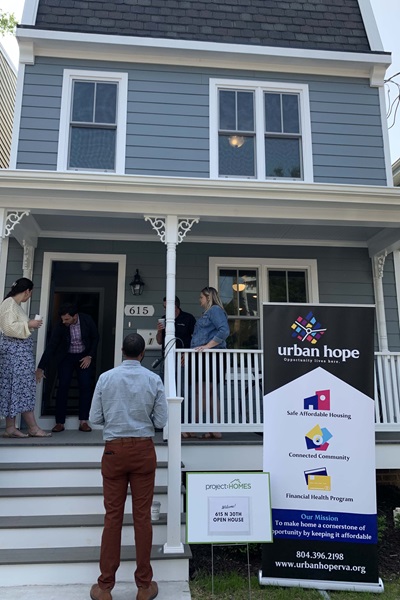Planning District Commission Grant Spotlight
Richmond Regional Planning District Commission (PlanRVA)
August 14, 2024In 2021, Virginia Housing announced the launch of the Planning District Commission Housing Development Program, allocating $40 million to a 21-member network of planning district commissions (PDCs) across the Commonwealth to support region-based approaches to housing projects and program development. The goal was to make it easier for regional and local organizations to collaborate on boosting the affordable housing supply across Virginia, and to strengthen the overall capacity that PDCs have for addressing state housing priorities.
PlanRVA, the PDC for the Richmond region, received a $3 million grant as part of this program.
As with many areas around Virginia, the need for help was clear.
“Our region faces a major shortage of 39,000 rental units for low-income households,” said Shelby Carney, Special Projects Director at the Partnership for Housing Affordability (PHA). “Median home prices have increased over 60% regionally in the past five years, putting homeownership out of reach for most.”
PlanRVA tapped Carney’s organization, a housing policy nonprofit, to direct and administer the funds because of its local expertise as well as its Regional Housing Framework ↗, a research-backed roadmap for addressing the Richmond region’s most pressing needs.
“Virginia Housing’s PDC grant came at a vital moment,” said Carney, “when projects that were already in predevelopment were experiencing unforeseen overages caused by construction material shortages and cost increases, labor shortages and supply chain issues, all caused by the pandemic. Those cost issues have continued, and affordability remains an issue as rent and home prices outpace income.”
The PDC Grant’s Impact in Richmond
PlanRVA has used its PDC grant award as gap funding for construction on 270 affordable housing units across eight of its nine jurisdictions, with a particular bump in production in rural and underserved markets. The money has also been used for innovative building practices such as modular construction and insulated concrete forms (ICF).
“This funding made an impact on a number of different levels,” said PlanRVA Executive Director Martha Shickle. “In the community, it allowed us to push critical projects over the finish line, and to give some of our nonprofit partners the added support they needed to be able to deliver a quality product.”
Carney echoed Shickle’s sentiment, noting that the PDC grant funds “have allowed us to prioritize projects that have an impact on marginalized communities and very low-income individuals and families. Homeownership opportunities were brought into reach for over 30 households — including veterans, families with school-aged children, persons with disabilities, teachers, mental health professionals, ship builders… the list goes on.”
The funds have also paved the way for deeper partnerships between local housing agencies, property donors and private sector builders. These relationships will have lasting positive effects on the effort to provide more affordable housing in and around Richmond.
“For PlanRVA,” said Shickle, “this gave us more of an ability to have a seat at the table and be a voice in the conversation around affordable housing. Over the course of the grant period, we’ve worked with both the PHA and a number of local jurisdictions to talk about the demand for affordable housing and how to fund it.”
For the PHA, collaborating with PlanRVA has also meant more administrative capacity, which has led to deeper engagement with other area initiatives such as the Henrico Affordable Housing Trust Fund.
Finally, while the grant was for $3 million, over $33 million in local, state and federal funding has been catalyzed by its associated projects. It also helped to attract additional funding from the Wells Fargo WORTH Initiative ↗, which works to expand homeownership opportunity for Black, Hispanic and other underserved individuals and families.
“The PDC grant showcases what is possible when significant investments in affordable housing are made,” said Carney. “These successes encourage support from community members and elected officials across the region to increase local investment in housing and participate in regional collaboration to address this issue.”
Below, you’ll find snapshots of some of the new housing whose planning and construction was made possible by Virginia Housing’s PDC grant:
Church Hill Partnership
This townhouse rental property showcases the power of local partnerships, as it was developed by project:HOMES and its land was donated by the Maggie Walker Community Land Trust, and it is managed by Urban Hope.

Photo courtesy of Partnership for Housing Affordability.
Cool Lane Commons
This permanent supportive housing rental project was developed by Virginia Supportive Housing ↗, this property entailed the substantial renovation of a former health care center that had sat vacant since 2008. It offers permanent supportive housing and independent living support for some of Richmond’s most vulnerable residents, many of whom have experienced chronic homelessness and/or severe mental and physical health challenges.

Before (left) and after photos of Cool Lane Commons courtesy of Henrico County.
Old Tavern Road
At this property, Habitat for Humanity – Powhatan ↗ pioneered the pairing of modular housing with the Habitat model. Much of the single-family home was built off-site, and contractors placed it at the site itself, but from there, Habitat volunteers installed interior walls, plumbing, tiling and electrical work. The photo below is from “Crane Day,” a celebration of the home being delivered and installed onto a permanent foundation.

Photo courtesy of Powhatan Habitat for Humanity.



